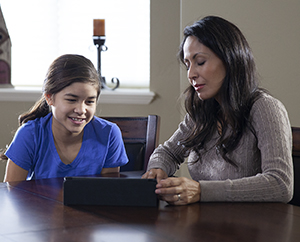Treating ADHD: Learning More
Before you can help your child, it helps to understand what ADHD is. Although ADHD is not a learning problem, it can interfere with learning. With the proper help, your child will find it easier to learn both at school and at home.

Learning about ADHD
One of the best ways to help your child is by learning about ADHD. You can start by believing that your child is not lazy or stupid. Once you understand the special needs that ADHD creates in your child, share what you learn with others. Some people may resist the diagnosis or deny the problem. Even so, let them know how they can help your child. With your knowledge, you will become your child's strongest advocate.
Learning with ADHD
Except in rare cases, there is nothing wrong with the intelligence of a child with ADHD. Work with your child’s teacher to make learning easier. Share the tips for teachers below. Keep in mind that federal law supports your child’s right to get the help they need. Ask your child's teacher or the school principal to explain these rights and how to access them.
Parent’s role
Here are some ways you can help your child:
-
Stay informed. Read about ADHD and the federal laws that protect your child in the school system. Join a local ADHD parent support group.
-
Reassure your child that ADHD is not their fault. Listen to their feelings about living with ADHD. Monitor social media to make sure that your child is not being bullied.
-
Request a teacher who can help your child. Stay in touch.
-
Create a tidy, quiet study space for your child at home.
Teacher’s role
Here are a few tips the teacher can try:
-
Engage in continuing education programs about ADHD. Learn about classroom strategies that work well.
-
Seat the child near the front of the room, away from any distractions such as windows or noisy radiators.
-
Find the best way to “reach and teach” the child. Use digital recorders, computers, or games if they help with learning.
-
Encourage the child to pursue their favorite subjects. Offer special projects to boost self-esteem.
-
Talk with ADHD specialists in the school or school district who can help set up a supportive educational plan.
-
If the child's ADHD seriously affects their ability to function in the classroom setting, talk with the ADHD specialists and parents about additional assessments. Ask about developing an individualized education plan (IEP).
Child’s role
Here are some hints for your child:
-
Tell your parents and teachers when you need their help.
-
Set aside one place at home and another at school to store your books, folders, and projects.
-
Make a list of your assignments and their due dates. Marking dates on a calendar can help.
-
Take short breaks between homework assignments. Set a timer to signal when to end the break and return to homework.
Online Medical Reviewer:
L Renee Watson MSN RN
Online Medical Reviewer:
Marianne Fraser MSN RN
Online Medical Reviewer:
Paul Ballas MD
Date Last Reviewed:
5/1/2022
© 2000-2024 The StayWell Company, LLC. All rights reserved. This information is not intended as a substitute for professional medical care. Always follow your healthcare professional's instructions.